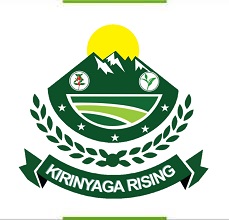‘Wezesha Kirinyaga’: The county economy game changer
Kirinyaga County Government is implementing an economic stimulus program that is poised to be the game changer in the county’s economy. The ongoing inaugural phase of the program dubbed ‘Wezesha Kirinyaga’ involves 159 community groups with an impact of around 2,500 households but will later be replicated across the farming fraternity.
“The program employs initiatives that make agricultural activities translate to better incomes and improved lives for all residents. It involves diversifying agricultural activities to reduce over dependence on traditional cash crops such as tea and coffee whose prices keep on fluctuating”, said Governor Waiguru when she launched the program. She also said that being a rural county with a population of 610,411, of which a majority depends on agriculture for a living, Kirinyaga has over the years depended on conventional cash crops such as tea and coffee. She noted that it was unfortunate that such crops were no longer dependable due to fluctuating international market prices and effects of climate change among other factors. “When I took over the county’s leadership, I was met with glaring gaps in the agricultural sector, the main challenge being low or no profit from agricultural activities. Together with the rural stakeholders, we came up with Wezesha Kirinyaga as an end to end economic stimulus program that is expected to turn around the agricultural sector and the county’s economy” said the governor.
Through Wezesha the county is undertaking projects in four agricultural value chains namely: poultry, dairy, tomato and avocado. “Our groundbreaking one million eggs project has already taken off with 32 community groups each rearing 1,250 layers producing at least one million eggs per month. The farmers, drawn from 640 households, get guaranteed returns since the county markets all the eggs on their behalf through Kirinyaga Investment Development Authority” she said.
The second phase of the project has also started with 45 more groups having been registered with an aim of replicating the project in order to increase production to 5 million eggs per month by 2022.
The governor said that the project was informed by the huge deficit in local egg production which made Kenya import over 10 million eggs per month from the neighboring country Uganda. To ensure that all the farmers got only the right breed of layers, the county government acquired chicks from a certified breeder on behalf of the groups. A total of 40,000 chicks were distributed to the farmers in the project. “Each of the group members will earn around Ksh. 1,000 daily from the Wezesha project which will enable them cater for their families. Besides keeping layers, families will still have time to attend to other income generating activities thereby increasing further their household incomes”, observed the governor.
Once the eggs are collected, they are taken to a cold storage facility located at Kiaga for packaging and branding before being taken to the market. The storage facility can handle around 3,500 trays of eggs at a given time. Governor Waiguru said that while day-to-day running of the project is done by the group members, the county’s veterinary and livestock extension officers attached to the project offer the necessary technical support to farmers to ensure success.
To ensure that farmers have access to quality and subsidized chicken feeds, the County Government, through Kirinyaga Agricultural Training Center animal production unit, manufactures feeds and distributes to farmers. The feeds factory has a capacity of producing about 220 bags of 70kg feeds every day and has so far produced around 1,000 tons of chicken feeds. The subsidized feeds not only reduce the cost of egg production but also saves farmers from getting substandard feeds from unscrupulous dealers.
Another value chain in Wezesha is tomato production which involves community groups that the county government is supporting in clean and disease tolerant seed production, alternative pest control and management systems. It is tied to a proposed tomato processing plant that will address the challenge of post-harvest loses in one of the largest tomato producing counties where more than 50 tons of tomatoes are produced annually.
The Wezesha program also addresses avocado production where the county government is supporting farmers to increase production of avocados through distribution of certified seedlings. So far, around 300,000 hass avocado seedlings have been given to farmers. The avocado project is tied to a proposed pack-house where the avocados will be packaged and branded before being marketed as Kirinyaga produce. Demand for Kenyan avocado had been rising by the day and this creates an avenue for farmers to capitalize on avocado farming which is now being touted as the green goldmine.
Dairy production is also another value chain in Wezesha in which farmers are supported in animal feed production, promotion of technologies such as artificial insemination (AI) and establishment of milk collection and cooling facilities. The dairy project is tied to a proposed county milk processing plant. The project targets enhanced milk production from the current 20,000 liters daily to 50,000 liters daily.



